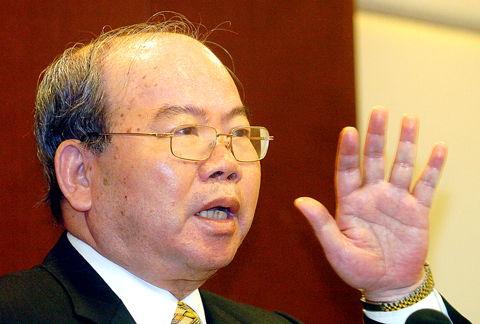The nation’s top prosecutor said yesterday that his department has decided to take a lenient approach in the investigations of abuses of special allowance funds.
State Prosecutor-General Chen Tsung-ming (陳聰明) said he had convened a meeting of head prosecutors nationwide yesterday morning, and that high-level prosecutors concluded that unless they could prove without question that government officials spent special allowance funds for private matters and therefore committed corruption, they would not charge the officials.
Chen said the prosecutors would like to see the Legislative Yuan introduce a law detailing how special allowance funds should be used.

PHOTO: LIU HSIN-TE, TAIPEI TIMES
Such a law would help prosecutors during investigations of special allowance fund abuse and aid judges during hearings involving corruption, Chen said.
More than 6,500 government officials are currently facing investigations into their use of special allowance funds.
The high-level prosecutors yesterday agreed a standard procedure for prosecutors’ investigating alleged corruption involving special allowance funds.
The Ministry of Justice said it would take a flexible approach and would not ask officials to list all their expenditure details.
The MOJ said that the special allowance fund should be seen as a “substantial subsidy” (實質補貼) to officials, and so a lenient approach whould be taken.
The ministry said that in the past it has been a unwritten rule that officials have flexibility when spending their special allowance fund.

The High Prosecutors’ Office yesterday withdrew an appeal against the acquittal of a former bank manager 22 years after his death, marking Taiwan’s first instance of prosecutors rendering posthumous justice to a wrongfully convicted defendant. Chu Ching-en (諸慶恩) — formerly a manager at the Taipei branch of BNP Paribas — was in 1999 accused by Weng Mao-chung (翁茂鍾), then-president of Chia Her Industrial Co, of forging a request for a fixed deposit of US$10 million by I-Hwa Industrial Co, a subsidiary of Chia Her, which was used as collateral. Chu was ruled not guilty in the first trial, but was found guilty

DEADLOCK: As the commission is unable to forum a quorum to review license renewal applications, the channel operators are not at fault and can air past their license date The National Communications Commission (NCC) yesterday said that the Public Television Service (PTS) and 36 other television and radio broadcasters could continue airing, despite the commission’s inability to meet a quorum to review their license renewal applications. The licenses of PTS and the other channels are set to expire between this month and June. The National Communications Commission Organization Act (國家通訊傳播委員會組織法) stipulates that the commission must meet the mandated quorum of four to hold a valid meeting. The seven-member commission currently has only three commissioners. “We have informed the channel operators of the progress we have made in reviewing their license renewal applications, and

‘DENIAL DEFENSE’: The US would increase its military presence with uncrewed ships, and submarines, while boosting defense in the Indo-Pacific, a Pete Hegseth memo said The US is reorienting its military strategy to focus primarily on deterring a potential Chinese invasion of Taiwan, a memo signed by US Secretary of Defense Pete Hegseth showed. The memo also called on Taiwan to increase its defense spending. The document, known as the “Interim National Defense Strategic Guidance,” was distributed this month and detailed the national defense plans of US President Donald Trump’s administration, an article in the Washington Post said on Saturday. It outlines how the US can prepare for a potential war with China and defend itself from threats in the “near abroad,” including Greenland and the Panama

A wild live dugong was found in Taiwan for the first time in 88 years, after it was accidentally caught by a fisher’s net on Tuesday in Yilan County’s Fenniaolin (粉鳥林). This is the first sighting of the species in Taiwan since 1937, having already been considered “extinct” in the country and considered as “vulnerable” by the International Union for Conservation of Nature. A fisher surnamed Chen (陳) went to Fenniaolin to collect the fish in his netting, but instead caught a 3m long, 500kg dugong. The fisher released the animal back into the wild, not realizing it was an endangered species at